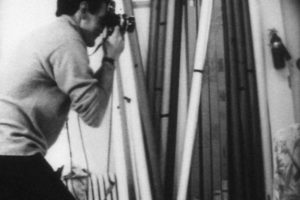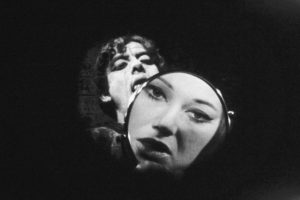
EXPRMNTL/ÂGE D’OR » ITALIA Avanguardia 1964-1975
ITALIA Avanguardia 1964-1975
Carmelo Bene / Paolo Gioli / Mario Schifano / Luca Patella / Alberto Grifi & Massimo Sarchielli
Si le cinéma italien des années 1960 est connu pour le succès international de ses réalisations dans le domaine du cinéma d’auteur, du film de genre ou de série B (premier produit d’exportation à l’époque), durant cette même période, et parallèlement aux développements menés dans d’autres pays, le cinéma est aussi envisagé en Italie par des cinéastes et artistes de diverses provenances comme un riche terrain d’expérimentation. Mettant à mal la notion de narration, interrogeant le rapport au réel ou envisageant le cinéma comme un champ d’expériences visuelles, leurs essais testent les limites du média avec enthousiasme et euphorie, réinventant le cinéma. Durant la deuxième moitié des années 1960, une structure telle que la Cooperativa Cinema Indipendente, fondée suivant le modèle américain de la coop, est exemplaire des initiatives apparaissant alors en Europe afin de promouvoir le cinéma de recherche (telles celles lancées en Allemagne par Birgit Hein et ses complices). Dans le contexte sociopolitique des années 1970, les protagonistes du mouvement italien s’engagent dans des voies isolées ou plus politisées.
Les trois séances composant ce programme mettent en avant le travail récemment réalisé par la Cineteca Nazionale de Rome, visant à la création d’une collection consacrée au cinéma d’avant-garde et au film d’artiste italiens. Les restaurations et nouvelles copies de ces œuvres (sur pellicule et/ou en numérique) sont destinées à encourager la (re)découverte et la circulation en festivals et cinémathèques de ces films peu connus. Ce programme a été élaboré avec Annamaria Licciardello (Centro Sperimentale di Cinematografia – Cineteca Nazionale), qui présentera plusieurs des projections.
De Italiaanse cinema van de jaren 1960 staat vooral bekend om het internationale succes van de auteurscinema, de genrecinema en de B-films (destijds het belangrijkste exportproduct). Maar in diezelfde periode werd, parallel aan de ontwikkelingen die plaatsvonden in andere landen, het medium film ook door allerlei filmmakers en kunstenaars ontdekt als een rijke proeftuin. Door de ondermijning van het concept ‘verhaal’, door de relatie tot de werkelijkheid te bevragen of door film te bekijken als een speelruimte voor visuele ervaringen tastten deze makers de grenzen van het medium enthousiast en euforisch af en vinden ze de filmkunst opnieuw uit. In de tweede helft van de jaren 1960 is de oprichting van op het Amerikaanse model van de coop geschoeide structuren zoals de Cooperativa Cinema Indipendente exemplarisch voor gelijkaardige initiatieven die overal in Europa opduiken om experimentele cinema te bevorderen (denk bijvoorbeeld ook aan Birgit Hein en haar handlangers in Duitsland). In de sociaal-politieke context van de jaren 1970 gaan de protagonisten van de Italiaanse beweging zich meer afzonderen of meer politieke paden bewandelen.
Dit programma bestaat uit drie onderdelen die de aandacht vestigen op de recente werkzaamheden van de Cineteca Nazionale in Rome, waar momenteel een collectie tot stand komt die gewijd is aan avant-garde cinema en Italiaanse kunstenaarsfilms. Restauraties en nieuwe kopieën van deze werken (op film en/of digitaal) moedigen de (her)ontdekking en circulatie van deze weinig bekende films aan. Dit programma kwam tot stand in samenwerking met Annamaria Licciardello (Centro Sperimentale di Cinematografia - Cineteca Nazionale), die verschillende vertoningen zal inleiden.
The Italian cinema of the 1960s is mostly renowned for its international success in the field of art-house cinema, genre films or B movies (the most important export product at the time). During the same period, and parallel to developments taking place in other countries, a group of Italian filmmakers and artists from various backgrounds approaches cinema as an open field for experimentation. By subverting the notion of narrative, questioning our relation to reality and considering cinema as a field of visual experiences, they test the limits of cinema with enthousiasm and elation, reinventing the art of cinema. During the second half of the 1960s, a structure such as the Cooperativa Cinema Indipendente that was founded after the American model of the coop is an ideal example of the initiatives then appearing in Europe to promote research cinema (such as those launched in Germany by Birgit Hein and her accomplices). In the socio-political context of the 1970s, the protagonists of the Italian movement either isolate themwelves or become more politicized.
The three screenings comprising this program highlight the recent work by the Cineteca Nazionale in Rome, creating a collection dedicated to Italian avant-garde cinema and art films. Restorations and new copies of these works (on film and / or in digital format) are designed to encourage the (re)discovery and circulation in festivals and cinematheques of these little-known films. This program was developed with Annamaria Licciardello (Centro Sperimentale di Cinematografia - Cineteca Nazionale), who will present several projections.


